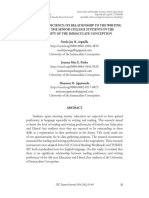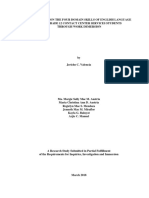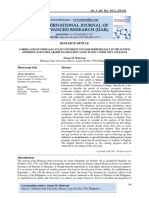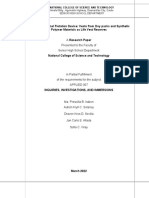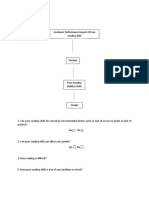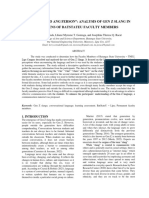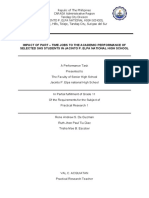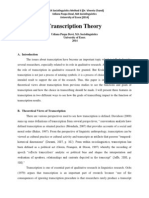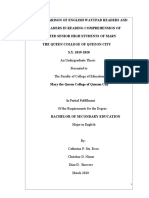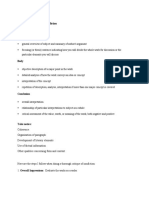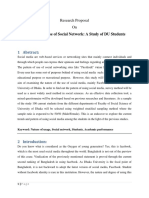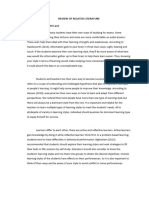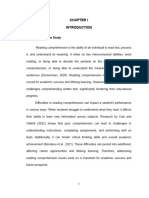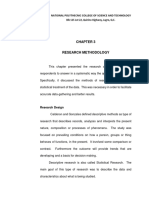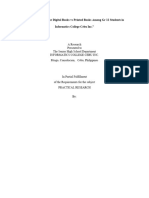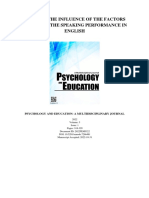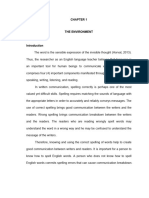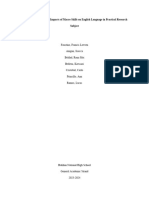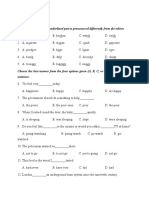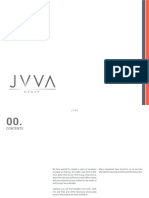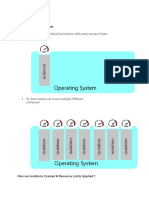Research
Research
Uploaded by
bexbexgirl14Copyright:
Available Formats
Research
Research
Uploaded by
bexbexgirl14Original Description:
Original Title
Copyright
Available Formats
Share this document
Did you find this document useful?
Is this content inappropriate?
Copyright:
Available Formats
Research
Research
Uploaded by
bexbexgirl14Copyright:
Available Formats
MANUEL LUIS QUEZON HIGH SCHOOL
SENIOR HIGH SCHOOL DEPARTMENT
Influence of Grammar Checkers on The Writing
Skills of Grade 11 Students at Manuel Luis Quezon
Senior High School
A Research Paper Presented to
Manuel Luis Quezon Senior High School
Research conducted by:
China S. De Oro
Allaine Myka P. Fabros
Rayjen P. Gonzales
Alexsa Rainzhel M. Hernandez
Nataniel C. Napay
Academic Year 2022-2023
Second Semester
Making Life of Quezonians Soaring in High Standards
MANUEL LUIS QUEZON HIGH SCHOOL
SENIOR HIGH SCHOOL DEPARTMENT
DECLARATION OF ANTI-PLAGIARISM
1. We, China S. De Oro, Allaine Myka P. Fabros, Rayjen P. Gonzales, Alexsa
Rainzhel M. Hernandez, and Nataniel C. Napay, understand that
plagiarism is the act of taking and using another’s ideas and works and
passing them off as one’s own. This includes explicitly copying the whole
work of another person or that of the undersigned proponents and/or
using some parts of their work without proper acknowledgment and
referencing.
2. We hereby attest to the originality of this research proposal and has cited
properly all the references used. We further commit that all output and
the final research study emanating from this proposal shall be of original
content. We shall use appropriate citations in referencing other works
from various sources.
3. We understand that violation from this declaration and commitment shall
be subject to consequences and shall be dealt with accordingly by the
school.
Name and Signature of Lead Proponent
Date
Name and Signature of Proponent
Date
Name and Signature of Proponent
Date
Making Life of Quezonians Soaring in High Standards
MANUEL LUIS QUEZON HIGH SCHOOL
SENIOR HIGH SCHOOL DEPARTMENT
ABSTRACT
With technological advancements, today's educational settings have
immensely changed. In this generation, technology brought on extensive
students' reliance on various digital services particularly, grammar checkers.
By applying the narrative approach, this study explores the influence of
utilizing grammar checkers on the writing skills of Grade 11 students at
Manuel Luis Quezon High School. In choosing the 20 respondents, purposive
sampling was employed. This study emphasizes the experiences, attitudes,
and perceptions of the students toward using grammar checkers in their
writing. Questionnaires were used as instruments for data gathering and to
further understand the influence. The results showed that students have a
positive perception toward using grammar checkers as it assists them in
writing. The study found that grammar checkers enhances the students'
writing skills and improves their written outputs through grammatical
feedback and suggestions provided. However, it is found that excessive
reliance on these tools adds to one's regression in terms of writing skills. This
study concludes that despite of the awareness on the possible consequences
of using grammar checkers, students still use the tools due to its benefits.
Since technology has negative effects depending on the way of utilization,
limitations and discipline are crucial to contribute to one's personal
development. Educators play a huge role in raising awareness and educating
the student body on the proper and effective use of digital services and tools.
Instead of solely correcting and changing errors, grammar checkers can be
effectively utilized in a learning environment if used as a pedagogical tool.
Making Life of Quezonians Soaring in High Standards
MANUEL LUIS QUEZON HIGH SCHOOL
SENIOR HIGH SCHOOL DEPARTMENT
ACKNOWLEDGEMENT
The study was made possible from the collective effort and support of
respective individuals which aided the researchers in the completion of this
study. The researchers express their sincerest gratitude to the following:
To Mrs. Joy Ragas, their research adviser for sharing her knowledge
and expertise. All her meaningful suggestions, perspectives, and guidance
helped in accomplishing this study.
To the respondents of this study, for their cooperation and
understanding. And, for spending their time to provide responses that helped
complete this study.
To their group, for the unwavering dedication and unity towards the
accomplishment of the study. Without all their efforts and cooperation, this
study would not be completed.
To the beloved families of the researchers, for their unending financial,
emotional, and moral support.
To the Almighty God, for the opportunity and guidance given to the
researchers. Everything would not be possible without him.
Making Life of Quezonians Soaring in High Standards
MANUEL LUIS QUEZON HIGH SCHOOL
SENIOR HIGH SCHOOL DEPARTMENT
TABLE OF CONTENTS
Chapter 1: The Problem and its Background...........................................1
Introduction............................................................................................1
Statement of the Problem........................................................................4
Significance of the Study.........................................................................4
Scope and Limitations.............................................................................5
Chapter 2: Review of Related Literature and Studies.............................6
Related Literature....................................................................................6
Related Studies.......................................................................................8
Synthesis of the Reviewed Studies...........................................................9
Theoretical Framework..........................................................................10
Conceptual Framework..........................................................................11
Definition of Terms................................................................................12
Chapter 3: Methodology.........................................................................14
Research Design....................................................................................14
Study Locale..........................................................................................14
Respondents..........................................................................................15
Data Collection Instruments..................................................................15
Data Gathering Procedures....................................................................16
Data Analysis Technique.......................................................................16
Chapter 4: Presentation and Interpretation..........................................17
Chapter 5: Summary, Conclusions, and Recommendations.................36
Summary..............................................................................................36
Conclusion............................................................................................37
Recommendation...................................................................................37
References...............................................................................................41
Appendices..............................................................................................45
Appendix A: Consent Form....................................................................45
Appendix B: Questionnaire....................................................................46
Appendix C: About The Researchers......................................................47
Making Life of Quezonians Soaring in High Standards
MANUEL LUIS QUEZON HIGH SCHOOL
SENIOR HIGH SCHOOL DEPARTMENT
Making Life of Quezonians Soaring in High Standards
1
MANUEL LUIS QUEZON HIGH SCHOOL
SENIOR HIGH SCHOOL DEPARTMENT
CHAPTER 1:
THE PROBLEM AND ITS BACKGROUND
INTRODUCTION
Technology made great changes in today's educational setting. The fast-
growing technological advancements brought on a vast spread of students'
reliance on digital services. In this generation, students are becoming more
absorbed in utilizing technological devices thus making it easier for them to
fulfill and accomplish academic work. By means of its essentiality, artificial
intelligence could also be one of the factors that may direct students in many
circumstances that can affect their way of learning, whether it results in
development or regression.
Among the preeminent products of technology are grammar checkers.
Its uses are solely convenient to students since it makes the writing process of
students easier and faster. These applications and tools are known by many,
in fact, their relevance is most likely present in places that do not use English
as their primary language. Those students who are having a hard time
constructing and improving their English vocabulary are the ones who would
seem to use grammar checkers to ensure that the content of their work is
clear and concise.
Countries such as the Philippines are considered to have deficiencies in
English writing skills. Majority of the Filipinos are inarticulate when it comes
to English grammar in both writing and communicating (Philstar, 2022).
Based on the experiences and observations in the teaching of a few Filipino
teachers, it is stated that; 1) many students lack English vocabulary, 2)
difficulty in conveying and organizing ideas, 3) students' perception that
writing is a hard task, etc. (Analyn and Cheryl, 2020).
Making Life of Quezonians Soaring in High Standards
2
MANUEL LUIS QUEZON HIGH SCHOOL
SENIOR HIGH SCHOOL DEPARTMENT
Basic English grammar lessons were taught as a beginning of learning
for students in writing during elementary education. However, levels of high
school and senior high are greatly elevated than previous levels that require a
lot of academic writing such as essays, the most common and frequently
asked to do for students. On the other hand, senior high school students are
confronted with different academic writing tasks through the subjects; English
for Academic and Professional Purposes (EAPP), Practical Research Courses
(PR I and PR II), and Reading and Writing Skills (RAWS).
Many studies have explored the aspects of different effects and help of
grammar checkers on people, and those studies have discussed the
effectiveness, advantages, and disadvantages of using such tools, and so on
(Park, 2020; Setyani, Bunau, & Rezeki, 2023; Perdana, 2019; Nguyen, 2022).
However, only a small number of interventions have so far been specifically
developed to the new academic degree, Senior high school, who have been
utilizing grammar checkers in making well-written texts. There is also a need
for a students-centered strengths-based intervention that provides these
young people with meaningful and empowering opportunities to practice their
writing skills with the aid of these tools and further build their writing skills.
Online grammar checkers as a result of technological advancement is
inevitable to be popular among students, with more complete features offered
to help improve writing (Perdana, 2019). Still, statistical and quantitative
analysis revealed that an AI-based grammar checker is not yet valid for all
error types for use, and is not a perfect detector and recommender of all error
types compared to human raters (Park, 2020). Whatever the reasons may be,
the bottom line is that the majority of students do not possess the skills
necessary to effectively communicate in a written format, and there is a
significant need for students at all to understand good writing skills. Despite
that, there is insufficient information to support these arguments and
predictions regarding the influence of grammar checkers on the writing skills
Making Life of Quezonians Soaring in High Standards
3
MANUEL LUIS QUEZON HIGH SCHOOL
SENIOR HIGH SCHOOL DEPARTMENT
of senior high school students who belong to the recently developed academic
level, the researchers fulfilled the gap through this qualitative study.
The gap of the study is attained by having selected senior high students
at Manuel Luis Quezon as the target subject. Information derived from them is
used to interpret conclusions about the general impact of utilizing those
mentioned applications on their writing skills. The following are the
hypotheses that are considered to validate and confirm in conducting the
study; 1) There is a significant relationship between the use of grammar
checkers and the writing skills of Grade 11 students, 2) Poor English
vocabulary and weak construction of grammar of students make them check
and paraphrase their written compositions, 3) The Grade 11 students perceive
grammar checkers as reliable applications that are useful and helpful in
writing, 4) Grammar checkers influence students to create well-written
sentences, effectively deliver messages, and learn more about grammar and
vocabulary, and lastly 5) Students would experience struggles in writing
without the help of grammar checkers.
The gap is important to fill for everyone to be able to comprehend and
understand how the writing skills of senior high students are affected and
influenced by utilizing such tools and applications, as well as the primary
reasons why they use them other than the improving and enhancing
compositions of texts. It is also significant for considering the current
condition of Filipino students’ English proficiency alongside the rising
technology era for the future’s benefit.
Having well-written text by practicing English as a secondary language
would be discernibly advantageous to students. By effective utilization of
grammar checker, students’ writing ability shall be enhanced for benefit that
should help them in the future.
Making Life of Quezonians Soaring in High Standards
4
MANUEL LUIS QUEZON HIGH SCHOOL
SENIOR HIGH SCHOOL DEPARTMENT
STATEMENT OF THE PROBLEM
The purpose of this study is to determine the influence of grammar
checkers on the writing skills of Grade 11 students at Manuel Luis Quezon
High School.
This study sought to answer the following questions:
1. What are the writing difficulties the students face?
2. How do the Grade 11 students perceive the use of grammar checkers?
3. How do using grammar checkers influence Grade 11 students?
4. How do the writing skills of students change with the use of the tools?
5. What themes arises from the responses of the Grade 11 students?
SIGNIFICANCE OF THE STUDY
The significance of this study is intended for the beneficiaries to be
educated on the influence of utilizing grammar checkers on the students'
writing skills. The following are the beneficiaries of the research;
Researchers. The outcome of the study is beneficial, as this will help them to
acquire new knowledge that will enhance personal skills and abilities.
Students. This will help students in enhancing their writing abilities by being
informed on appropriate and effective utilization of grammar checkers.
Making Life of Quezonians Soaring in High Standards
5
MANUEL LUIS QUEZON HIGH SCHOOL
SENIOR HIGH SCHOOL DEPARTMENT
Educators. This study will help educators to devise early solutions and
provide guidance for students about the perceived effects of using grammar
checkers.
School. This will guide the institution to develop useful strategies and
solutions to enhance students’ writing skills. The results from conducting this
study will help the development of students’ writing skills inside the
institution.
Future Researchers. This research can be one of the basis and added to the
body of knowledge of future studies on the possible influence of grammar
checkers on students' writing skills.
SCOPE AND LIMITATIONS
This study focuses on how the use of grammar checkers applications
influences students’ writing skills. This study is conducted with the
cooperation of selected Grade 11 students at Manuel Luis Quezon Senior High
School that covered only the school year 2022-2023. The research only
focused on the information that has been gathered from the interview and the
concepts of other previous studies.
This explores whether the students rely too much on these tools, or if
they can use them effectively in improving their writing skills. However, the
scope of the research do not cover other AI-based tools including plagiarism
checker and paraphrasing tools.
Making Life of Quezonians Soaring in High Standards
6
MANUEL LUIS QUEZON HIGH SCHOOL
SENIOR HIGH SCHOOL DEPARTMENT
CHAPTER 2:
REVIEW OF RELATED LITERATURE AND STUDIES
This chapter includes ideas, thesis, dissertations, conclusions,
methodologies, findings, and others. Those that were included are relevant
and similar to the present study.
RELATED LITERATURE
Grammar Checkers
All writers want to eliminate grammatical errors, erroneous wordings,
and misspellings to deliver their ideas clearly and produce a well-written text
(Krull, 2019). This is where grammar checkers come into play. Grammar
checkers are commonly utilized to assist in writing and correct writing
mistakes. It is a program or a software embedded into a word processor or a
standalone website that identifies grammatical errors (Britannica, 2021).
Grammar checkers provide grammatical feedback and suggestions to
the writer and even automatically eliminates errors directly in the text. It uses
references from an incorporated dictionary and a list of rules for proper usage.
However, according to Krull (2019), grammar checkers are not integrated into
a word processor program; it runs separately on text generated employing the
word processor.
Writing Skills
Making Life of Quezonians Soaring in High Standards
7
MANUEL LUIS QUEZON HIGH SCHOOL
SENIOR HIGH SCHOOL DEPARTMENT
Writing skills include the knowledge and abilities related to expressing
ideas and messages through the written word. It allows people to get a point
across without being physically present (Herrity, 2023). Good writing skill
allows someone to communicate the main points to the intended audience
without using unnecessary words and in a way that others can understand
therefore, producing an output that is clear and concise. Writing skills include
spelling, punctuation, capitalization, grammar, and sentence structure.
Benefits and Drawbacks of Grammar Checkers
In his published book titled “The Broadview Guide to Writing”, Okun et
al. (2023), mentioned that even though grammar checkers will help identify
grammatical errors, it has many significant limitations. He stated that
grammar checkers can help identify: fused sentences, misused prepositions,
wordy sentences, and missing apostrophes in contractions. Meanwhile,
grammar checkers can easily miss: misplaced modifiers, sentence fragments,
problems with adverbs or adjectives, misused or missing commas, and lastly,
errors in both subject-verb and pronoun-antecedent agreements. Grammar
checkers will also often suggest that there are errors in the text when in fact,
nothing is wrong. Thus, Okun et al. suggested that no computer software can
provide a reliable alternative for careful proofreading.
Kim et al., (2014) believed that grammar checker plays a significant role
in language learning and learners can receive immediate corrective feedback
when using it. In terms of language learning, Mammadova (2019), added that
grammar checkers play a crucial role especially when additional language
teaching materials are required and teachers cannot find what they need in
textbooks. Many authors including Winner (2020), consider grammar checkers
as great instructional aids that identify problems within the text and provide
suggestions. However, Miller (2022) stated in his book “Writing in Psychology”,
that when utilizing grammar checkers, it is better to reread carefully so that
there are no remaining errors in the text.
Making Life of Quezonians Soaring in High Standards
8
MANUEL LUIS QUEZON HIGH SCHOOL
SENIOR HIGH SCHOOL DEPARTMENT
According to Saxena et al. (2021), grammar checkers help implement
the writer’s views and writings in a better linguistic manner. It can also
increase the readability of the content and help convey the message easily.
Despite this, it is believed that grammar checkers are less reliable than
human proofreaders (Mitchell & Florescu-mitchell, 2019). It is because the
writer or the proofreader knows what is meant to be said in the text, but the
machine does not. Therefore, it depends on the writer whether to accept or
reject suggestions given by the tools and the checkers.
RELATED STUDIES
Correlation between Grammar Checkers and Student’s Writing Skills
Since students must be knowledgeable of grammatical rules and
appropriate sentence structures to express their ideas in their work, students
can feel unmotivated and discouraged in learning how to write (Karyuwatry et
al., 2018). Students utilize these kinds of tools because the features offered
meet the needs of their writing (Perdana & Farida, 2019). From the studies, it
can be concluded that there are various reasons why students utilized these
tools in their writing.
In the study conducted by McCarthy et al., (2019), results showed that
respondents with access to grammar checkers improved the quality of their
essays including word choice, grammar, organization, voice, and conclusion.
But, there are unaffected aspects which are sentence structure, unity,
introduction, and body. According to Pratama (2020), the lack of grammar
knowledge hinders students’ writing thus, students utilize grammar checkers
to assist them with their writing. Grammatical feedback allows students to
identify their errors while writing, therefore, making them aware of their
mistakes and improving their writing.
According to Cavaleri & Dianati (2016), research about online grammar
checkers particularly about student’s responses toward the tool is limited.
Making Life of Quezonians Soaring in High Standards
9
MANUEL LUIS QUEZON HIGH SCHOOL
SENIOR HIGH SCHOOL DEPARTMENT
However, some existing studies cover the topic of grammar checkers. In the
study done by O’Neil & Russell (2019), it is shown that Grammarly—a popular
grammar checker—as a source of grammar feedback gave more satisfaction to
students in terms of the advice provided compared to non-Grammarly
students. Also, Halim (2022) stated in his findings that all students he
interviewed, believed that their writing improved in terms of grammatical
structure and their exposure to Grammarly deepened their grammatical
understanding which resulted in better writing. Similar results also occurred
in Cavaleri & Dianati’s (2016) study with respondents stating that most of the
students felt they have improvements in their writing when Grammarly offered
suggestions that made them have a better score.
Additionally, Ghufron & Rosyida (2018) also stated that students who
utilized Grammarly would improve their writing as they can evaluate their
mistakes. This supports another study done by Jayavalan & Razali (2018)
wherein the findings showed that Grammarly aided students in their narrative
writing, particularly in terms of grammar functions. It is worth mentioning
that studies done about grammar checkers mostly include Grammarly as the
main application since it is widely used and prominent.
Yang (2018) revealed that students have relatively positive attitudes
toward grammar checkers and findings showed that there are fewer
grammatical errors in writing when grammar checker is utilized. Yang also
implied that grammar checkers could be used as a pedagogical tool in
language learning. From the studies, it is shown that while these tools can
positively or negatively impact one’s writing skills, it is the writer’s decision to
accept or reject the suggestions while still being able to at least maintain the
original meaning of the text.
Making Life of Quezonians Soaring in High Standards
10
MANUEL LUIS QUEZON HIGH SCHOOL
SENIOR HIGH SCHOOL DEPARTMENT
SYNTHESIS OF THE REVIEWED STUDIES
Based on the aforementioned literature and studies, it is important to
mention that grammar checkers are helpful and useful in writing but it has
significant limitations which reduce its reliability and show its failure to judge
a text. While there are specific areas of writing that these digital applications
can examine, it is still not enough to completely scrutinize every crack and
nook of a written text with regard to its context and the author’s intended
meaning. In addition, respondents who are mostly students perceive these
digital applications as a great alternative to improve their writing and
vocabulary. Grammar checkers can both negatively and positively affect the
writing skills of the students based on how it is utilized and whether the
students accept or reject the suggestions.
THEORETICAL FRAMEWORK
This study is anchored on Lev Vygotsky’s (1986) theory of Zone of
Proximal Development (ZPD). The Zone of Proximal Development is defined as
the space between what a learner can do without assistance and what a
learner can do with guidance or in collaboration with an assistant (Billings,
2017). It is based on the idea that learning can lead to development, and
development can lead to learning. The ZPD is the area between a learner’s
level of independent performance (often called developmental level) and the
level of assisted performance—what the child can do with support (Jayavalan
& Razali, 2018). Vygotsky (1978) also believed that some ‘tool’ mediates this
activity and these tools might be physical, such as using computers, or
psychological.
Grammar checkers are related in giving aid to students when they are
given writing tasks. The relevance of the theory of ZPD to the study aligns with
how much assistance the grammar checker is applied on students’ writing
Making Life of Quezonians Soaring in High Standards
11
MANUEL LUIS QUEZON HIGH SCHOOL
SENIOR HIGH SCHOOL DEPARTMENT
skills or within their ZPD. This is where students can learn the process of
writing or develop their skills, but with the advent of online grammar
checkers. The theory promotes a learning approach which is self-directed
learning where the students’ writing skills are influenced by engaging with
these tools.
ZPD
ZPD
A
A
Figure 1: Zone of Proximal
Development
Figure 1 shows the model of the theory, Zone of Proximal Development
where circle A indicates the zone where learners can do assigned tasks
without any assistance such as technology, or other help of people. This is
where students can independently learn, create, and develop their writing
abilities without the aid of grammar checkers
However, ZPD is the zone where learners can only learn with assistance
of either technology or other people. This zone is relevant in the study in terms
of how does engagement with grammar checkers influence the learner’s
writing skills. Those abilities depends on how they utilize and percept
grammar checkers for them to be able to learn and accomplish their tasks. For
the last zone in Figure 1, zone B pertains to the tasks that learners cannot do
even with assistance. This zone suggests to reliance of learners to grammar
checkers which influences the learner’s writing skills to adhere and make
moderate development to their skills.
Making Life of Quezonians Soaring in High Standards
12
MANUEL LUIS QUEZON HIGH SCHOOL
SENIOR HIGH SCHOOL DEPARTMENT
Overall, Lev Vygotsky’s theory of Zone of Proximal Development has
relevance to this study above all zones of the theory. This zone applies the
concept of the study where the writing skills of the students are influenced by
the aid of grammar checkers.
CONCEPTUAL FRAMEWORK
Grammar Student’s Writing
Checkers Skills
Figure 2
Figure 2 presents the conceptual framework of the study. This study
revolves around two variables; the utilization of grammar checkers as an
independent variable and the student’s writing skills as the dependent
variable.
A grammar checker is a tool designed to automatically check your text
for spelling errors, grammatical issues, punctuation mistakes, and problems
with sentence structures. Another variable, is writing skills are simply the
skills used to write effectively and succinctly. Students need to use strategies
to be able to convey their messages clearly to the intended audience. Writing
skills include punctuation, grammar, sentence structure, capitalization, and
vocabulary.
This study examined the influence of grammar checkers on the writing
skills of Grade 11 students. Students who have been engaged with grammar
checkers have significant changes in their writing skills which suggests either
Making Life of Quezonians Soaring in High Standards
13
MANUEL LUIS QUEZON HIGH SCHOOL
SENIOR HIGH SCHOOL DEPARTMENT
improvement or deterioration due to reliance on these tools. Moreover,
students’ engagement with these tools also depends on how they perceive
grammar checkers. Many find these tools convenient which suggests more
engagement of students and may influence their writing skills in many
perspectives. This study carefully assessed the two variables, grammar
checkers and students’ writing skills, to further understand their
interconnectedness.
DEFINITION OF TERMS
AI (Artificial Intelligence) - a system in which there is no human intervention
to produce automatic results and outputs, it is usually integrated into
grammar checkers.
Grammar checkers - are software applications that provide grammatical
suggestions, correct and mention errors, and fix sentence structures on
outputs/texts that are submitted.
ICT (Information Communication Technology) - encompasses all technological
devices and advancements used to transmit, create, manipulate, and store
data.
Making Life of Quezonians Soaring in High Standards
14
MANUEL LUIS QUEZON HIGH SCHOOL
SENIOR HIGH SCHOOL DEPARTMENT
Software - are intangible applications installed in a program or device, it
performs specific tasks catered for its users.
Writing skills - are the knowledge and skills related to expressing ideas
through written words. This includes punctuation, spelling, capitalization,
syntax, and grammar.
CHAPTER 3: METHODOLOGY
This part of the study outlines the methods used in gathering data that
are relevant to the study. This includes the process in acquiring information
that aided the researchers in comprehending the study.
RESEARCH DESIGN
The researchers opt for a qualitative research approach to have an in-
depth exploration on the students' experiences and perceptions toward the
utilization of grammar checkers. Qualitative research is a type of research that
Making Life of Quezonians Soaring in High Standards
15
MANUEL LUIS QUEZON HIGH SCHOOL
SENIOR HIGH SCHOOL DEPARTMENT
seeks to understand human behavior and experiences through collection and
analysis of non-numerical data (Chai et al., 2021).
The researchers utilized the narrative method under the qualitative
study to gather sufficient information on how the use of grammar checkers
influences students’ writing skills. The narrative method focuses on
understanding a phenomena by examining and interpreting the stories and
narration that respondents shared in order to gain insights into the meanings,
perceptions, and experiences. This study sought to identify students’ attitudes
and perceptions toward these writing tools as well as to determine the
influence of grammar checkers on the their writing skills
STUDY LOCALE
The study is conducted at Manuel Luis Quezon High School, a public
secondary school located at Camia Street, Malaria, Barangay 185, North
Caloocan City. The respondents have been given a questionnaire inside the
school premises.
Manuel Luis Quezon High School was chosen as the research setting
because the researchers considered the place convenient and safe for both
parties. It allows the researchers to conduct the study effectively since it is
accessible and flexible.
RESPONDENTS
In selecting respondents for the study, the researchers employed the
purposive sampling method. It is a non-probability sampling in which
participants are chosen because they possess characteristics that are required
in the study. Purposive sampling sets criteria to find respondents that can be
helpful to the researchers in answering the research questions.
Making Life of Quezonians Soaring in High Standards
16
MANUEL LUIS QUEZON HIGH SCHOOL
SENIOR HIGH SCHOOL DEPARTMENT
The respondents of the study are composed of selected twenty (20)
students. They must be Grade 11 Senior High School students who are
currently enrolled at Manuel Luis Quezon High School. The respondents must
be experienced and knowledgeable in using grammar checkers in writing. They
should have used at least one or more grammar checkers.
DATA COLLECTION INSTRUMENT
The researchers chose questionnaire as the research instrument for the
study. Since gathering information needs to be done carefully, consent forms
are administered first.
Questionnaire
The researchers administered questionnaires to the selected twenty (20)
respondents to acquire sufficient information needed to the study. A
questionnaire includes prepared questions that are useful in gathering
detailed information from participants, the questions are written in paper and
distributed to the respondents who are carefully selected. The questionnaire
consists of seven (7) open-ended questions which allowed respondents to
submit their preferred responses.
DATA GATHERING PROCEDURES
The researchers initiated the following procedures to gather enough
information to determine the influence of grammar checkers on the writing
skills of Grade 11 students. The questionnaire has been validated by Mr. Jose
Lorenzo Espina of Manuel Luis Quezon High School while the consent form
has been approved by Mrs. Joy Ragas, the senior high school research adviser.
Making Life of Quezonians Soaring in High Standards
17
MANUEL LUIS QUEZON HIGH SCHOOL
SENIOR HIGH SCHOOL DEPARTMENT
This study used primary data through the questionnaires given to the
twenty (20) respondents. Depending on the availability of the respondents,
both face-to-face and online distribution of questionnaires are conducted. In
face-to-face, researchers gathered data about the profile and experiences of
the students. In collecting sufficient information online, the study used Google
Forms however, researchers requested consent first. Google Forms is an online
tool that can be used to create and edit surveys to share with other people.
DATA ANALYSIS TECHNIQUE
The researchers used thematic analysis to examine the influence of
grammar checkers to the student’s writing skills. Thematic analysis is a
qualitative research method used to examine the data and identify common
themes, topics, ideas, and patterns. The study used an inductive approach
which involves allowing the data to determine the themes.
The first step in the thematic analysis is assessment, researchers
looked through the data and take initial notes; the second is coding which
means highlighting sections of the text and converting the responses of the
participants into labels or codes to have themes; third, categorizing the themes
and finding patterns; fourth, responses are reviewed and organized, and last,
analyzing and interpreting the data.
Making Life of Quezonians Soaring in High Standards
18
MANUEL LUIS QUEZON HIGH SCHOOL
SENIOR HIGH SCHOOL DEPARTMENT
CHAPTER 4:
PRESENTATION AND INTERPRETATION
This chapter includes the results of the study based on the data
gathered. Through thematic analysis, interpretation and presentation of the
information obtained are displayed.
Table 1. Writings struggles and difficulties of Grade 11 students
Significant Struggles and
Questions
Statements Difficulties
1. What do you think “In writing, incorrect Grammatical Errors
are the struggles and grammar is inevitable, so
difficulties you face the struggles and
while writing? difficulties I face while
writing is the wrong
grammar.” (R12:Q1)
“I think it’s my grammar.
I’m not sure whether am
I really using the right
words or no. This is
where I truly struggle.”
(R17:Q1)
“As someone who’s fond Poor Vocabulary
of writing, synonymous
and searching for a
better term that fits a
context more naturally
becomes an obstacle for
Making Life of Quezonians Soaring in High Standards
19
MANUEL LUIS QUEZON HIGH SCHOOL
SENIOR HIGH SCHOOL DEPARTMENT
me.” (R10:Q1)
“Finding the synonym for
the exact word.”
(R18:Q1)
“I notice usually that my
struggles and difficulties
in writing are where I
hardly cannot bring the
right terminologies or
wordings in my writing.”
(R15:Q1)
“Having a hard time to Poor Sentence
construct a good Structure
sentence or paragraph.”
(R8:Q1)
“Sometimes, I experience
having difficulty with
generating idea, and
language problems.”
(R6:Q1)
“I sometimes have Improper Usage of
difficulty with how to use Verb Tenses
proper verb tenses.”
(R5:Q1)
“The usage of the correct
Making Life of Quezonians Soaring in High Standards
20
MANUEL LUIS QUEZON HIGH SCHOOL
SENIOR HIGH SCHOOL DEPARTMENT
tense of the verb in a
sentence.” (R13:Q1)
“My writing maybe Spellings and
wrong in the word or it Punctuation
maybe in its spelling.”
(R2:Q10)
“The struggles and
difficulties that I face
were punctuation. I also
have difficulties on
spelling of words. I
sometimes get confused
when I don’t know what
punctuation should I use
in my writing.” (R4:Q1)
“The proper placing of
punctuation marks.”
(R13:Q1)
The findings suggest that the participants struggle with different
aspects of writing. The most significant themes that emerged from the
statement are grammatical errors, poor vocabulary, poor sentence structure,
improper usage of verb tenses, and spelling and punctuation. Most of the
respondents mentioned that incorrect grammar is a major obstacle for them.
They struggle with using the right words and constructing grammatically
correct sentences. Students’ responses showed that it is challenging to find
the right words to express ideas and thoughts. Some students also struggle
with sentence structures and proper usage of verb tenses, finding it hard to
Making Life of Quezonians Soaring in High Standards
21
MANUEL LUIS QUEZON HIGH SCHOOL
SENIOR HIGH SCHOOL DEPARTMENT
construct a good sentence or paragraph. Finally, spelling and punctuation are
also areas where students face difficulties. They find it challenging to use the
correct punctuation marks and spell words correctly.
Table 2.1 Grammar checker applications utilized by Grade 11 students
Questions Significant Grammar Checker
Statements Applications
2. What specific “I often use grammarly to Grammarly
grammar checker do check my grammar if it’s
you use? right or wrong.” (R8:Q2)
“I’m using the Grammarly
app.” (R2:2)
‘What I use to check and
correct my grammar is
Grammarly.” (R1:Q2)
“I usually use Quillbot.” Quillbot
(R16:Q2)
“Quillbot. It’s the only
grammar checker I can
freely use, so I’ve settled
for it.” (R10:Q2)
“I used Quillbot and Both Grammarly &
Grammarly.” (R6:Q2) Quillbot
“I often use Quillbot and
Grammarly.” (R7:Q2)
Making Life of Quezonians Soaring in High Standards
22
MANUEL LUIS QUEZON HIGH SCHOOL
SENIOR HIGH SCHOOL DEPARTMENT
“Specifically, I use Quillbot
and Grammarly as my
primary helping tool in
writing efficiently.” (R9:Q2)
“The grammar checker I Reverso
usually use is the
Reverso.” (R3:Q2)
Based on the results, most Grade 11 students use grammar checker
applications to check their grammar and improve their writing skills.
Grammarly and Quillbot are the most commonly used grammar checker
applications among the respondents, with some students using both
applications and one student using Reverso. Grammarly is an online writing
assistant that helps users detect and correct grammar, punctuation, spelling,
and style errors while Quillbot offers grammatical assistance that provide
suggestions and improve syntax of the text. Reverso is an online language tool
that also provide grammatical assistance. Overall, the findings suggest that
grammar checker applications are being utilized by Grade 11 students in
Manuel Luis Quezon High School.
2.1.1 Satisfaction of the students with the use of grammar checkers
Questions Statements Applications
Satisfied Unsatisfied
Do you feel “I am satisfied Grammarly
satisfied when because it gives
using it? Why proper or correct
or Why not? spellings that I
sometimes don’t
Making Life of Quezonians Soaring in High Standards
23
MANUEL LUIS QUEZON HIGH SCHOOL
SENIOR HIGH SCHOOL DEPARTMENT
know.” (R5:Q2)
“I’m happy to use
this kind of
grammar checker,
because it not just
help me to correct
my grammar but it
also help me to
enhance.” (R8:Q2)
“I feel satisfied
when I’m using
this Grammarly
because this
grammar checker
helps me a lot.”
(R12:Q2)
“I’m satisfied, Quillbot
because it has a
lot of special
features for writing
purposes.”
(R10:Q2)
“I can say that I
am happy to use it
because it has
improved my work
even more.”
(R15:Q2)
Making Life of Quezonians Soaring in High Standards
24
MANUEL LUIS QUEZON HIGH SCHOOL
SENIOR HIGH SCHOOL DEPARTMENT
“I’m quite Reverso
satisfied with it,
because there is
still something
lacking and the
grammar is still
having an error.”
(R3:Q2)
It is shown that majority of the Grade 11 students are satisfied with
using grammar checker applications such as Grammarly and Quillbot.
Indicating that grammar checkers make writing easier and improve the way
they write. This may be because grammar checkers identify common mistakes
and provide suggestions for correction, which can lead to a better quality of
work. However, one student (R3) have a negative attitude. The student pointed
out that there are still errors in the grammar checking process of Reverso,
implying that not all grammar checkers are perfect and flawless.
Table 3. Students’ perception on whether grammar checkers affects their
writing skills
Questions Significant Statements Themes Emerged
3. Do you think the “Opo, dahil hindi ko na Positive Attitude
use of grammar kailangan mag-isip at
checkers affect the napapadali nito ang
way you write? How aking mga ginagawa.
do you say so? Dahil din dito mas
marami na akong
nagagawang mga
assignment at
nakakagawa na rin ako
Making Life of Quezonians Soaring in High Standards
25
MANUEL LUIS QUEZON HIGH SCHOOL
SENIOR HIGH SCHOOL DEPARTMENT
sa mga gawaingbahay.”
(R4:Q3)
(Yes, because I don't
have to think and it
makes it easier.
Because of this, I have
been able to do more
assignments.)
“It improved the way I
write and I became more
aware of the common
mistakes that I make
when I’m writing.’’
(R9:Q3)
“Naapektuhan ang aking
pagsulat kapag
gumagamit ako ng
grammar checker dahil
nakakatulong ito na mas
gumanda ang gawa ko
pero ipinapakita noito na
kailangan ko pa ayusin
ang aking grammar.”
(R15:Q3)
(This affects me because
it helps my work to be
better but it shows that
I still need to fix my
grammar.)
Making Life of Quezonians Soaring in High Standards
26
MANUEL LUIS QUEZON HIGH SCHOOL
SENIOR HIGH SCHOOL DEPARTMENT
“Grammar checker Negative Attitude
translates [interprets] it
wrong, the idea, the
thought, and all the
things you want to say
or express can be
different from what you
really want to say.”
(R3:Q3)
These findings suggest that students have different perceptions about
the impact of grammar checkers on their writing skills. Some students have a
positive attitude toward grammar checkers, as it makes their writing easier
and helps them to identify common mistakes. These students believe that
using grammar checkers improved their writing skills. While, some students
have a negative attitude toward grammar checkers, stating that it can
mistranslate their ideas and expressions, leading to their work not reflecting
what they want to convey.
Table 4. Differences in student's writing skills with the use of grammar checkers
Questions Significant Themes Emerged
Statements
4. Do you notice any “As the time passes by, I There are differences
differences in your notice that using
writing skills when Grammarly enhances
you use grammar my writing skills as it
checkers? Why or why helps me to be more
not? familiar with the
grammar mistakes I
Making Life of Quezonians Soaring in High Standards
27
MANUEL LUIS QUEZON HIGH SCHOOL
SENIOR HIGH SCHOOL DEPARTMENT
made.” (R5:Q4)
“Yes, it becomes more
coherent and logical. My
informal tone also gets
corrected.” (R10:Q5)
“Yes, if I use the
grammar checker, I can
correct the errors in the
text I’m writing while if I
don't use the errors
remain.” (R14:Q4)
“No, I don’t. Grammar There are no differences
checkers didn't affect my
style or way of writing. I
only use them to double
check my grammar or
spot my writing errors.”
(R19:Q4)
Based on the results, most of the Grade 11 students have seen
differences in their writing skills whenever they use grammar checkers. R10
stated that the informal tone gets corrected while R5 said that the grammar
checker helped them to be familiar with grammar mistakes. However, another
respondent stated that there are no changes in the writing s since it is only
used for double-checking. To summarize, their Grade 11 students have
dividing statements about whether grammar checkers cause changes or
differences in their writing skills but the majority address apparent changes in
their writing skills and written outputs.
Table 5. Students’ perception of advantages and disadvantages of utilizing
grammar checkers towards their writing
Making Life of Quezonians Soaring in High Standards
28
MANUEL LUIS QUEZON HIGH SCHOOL
SENIOR HIGH SCHOOL DEPARTMENT
Questions Significant Statements Themes
Emerged
5. What do you Advantages
think are the
“The user may determine what’s A. Helps in
advantages and
wrong with his/her grammar and determining
disadvantages of
improve the way they write their errors in text
using grammar
work.” (R8:Q5)
checkers in your
writing skills? “The advantage of it is it helps me to
identify errors.” (R11:Q5)
“I think it helps to identify errors in our
sentence.” (R18:Q5)
“The good thing about using the B. Helps in
grammar checker is that it helps in correcting
correcting the wrong spelling and errors (e.g.,
correcting it in grammar, especially spelling,
when making an essay.” (R2:Q5) grammar}
“It helps a student to enhance and
correct grammar.” (R6:Q5)
“For the advantages, I think it helps a C. Helps in
student in their academic works” academic
(R10:Q5) works
“I think grammar checkers can assure
you that your work is properly
written.” (R19:Q5)
Disadvantages
“This may cause wrong interpretation A. Wrong
and your thought and ideas can be
Making Life of Quezonians Soaring in High Standards
29
MANUEL LUIS QUEZON HIGH SCHOOL
SENIOR HIGH SCHOOL DEPARTMENT
change also” (R3:Q5) interpretation
“Ang maganda rito ay napapadali ang B. Excessive
iyong mga ginagawa, at ang reliance
masamang epekto ay maraming mga
estudyante ang umaasa nalang dito.”
(R3:Q5)
(The good thing about it is that it
makes your work easier and the bad
effect is that many students just rely
on it.)
“I think I rely to Grammarly too much.”
(R5:Q5)
“The disadvantage are over-reliance
and dependency” (R7:Q5)
“Most of the time you will only rely on
this grammar checker.” (R14:Q5)
“Grammar checker I use is not always C. Grammar
correct.” (R12:Q5) checkers are
not always
correct
“Some students rely their grammar on D. Cause of
this app, and some are getting lazy laziness
when constructing sentences or
paragraphs.” (R17:Q5)
“Mas nagiging tamad ka matuto para
sa kaayusan ng grammar.” (R15:Q5)
(You will be more lazy to learn the
Making Life of Quezonians Soaring in High Standards
30
MANUEL LUIS QUEZON HIGH SCHOOL
SENIOR HIGH SCHOOL DEPARTMENT
arrangement of your grammar)
From the results, it is shown that students' perceptions toward
grammar checkers are varied. According to some students, grammar checkers
are advantageous since it helps in determining errors in text, corrects errors
(e.g., spelling, punctuation), and it helps in academic works. In addition,
students also mentioned the disadvantages of grammar checkers. From the
themes, grammar checker offers wrong interpretation of the text and is said to
be not always correct. Aside from these, students also added that utilization of
grammar checkers cause laziness and excessive reliance.
Table 6: Reasons on why students utilize grammar checkers in writing
Questions Significant Statements Themes Emerged
6. Why do you think “To make sure that the A. For grammatical
students like you tend grammar or spelling I correction (e.g.,
to utilize grammar write is correct.” (R5:Q6) spelling, grammar,
checkers in writing? sentence structure,
“To correct my
punctuation)
grammar.” (R6:Q6)
“Para maitama nila o
natin ang mga maling
spelling at bantas sa
pagsulat ng isang
pangungusap.” (R4:Q6)
(So that they or we can
correct the spelling and
punctuation errors in
writing a sentence.)
Making Life of Quezonians Soaring in High Standards
31
MANUEL LUIS QUEZON HIGH SCHOOL
SENIOR HIGH SCHOOL DEPARTMENT
“To make sure that the
text they are writing has
no error in spelling,
grammar, and
punctuation." (R14:Q6)
“As for my observation, B. Lack of confidence in
many of students like writing
me, use grammar
checkers because they
are not confident with
their grammar.” (R3:Q6)
“’Yun ay dahil baka
hindi rin sila confident
sa grammar nila o di
naman kaya ay takot
silang magkamali.”
(R16:Q6)
(Because they may be
not confident on their
grammar and they are
afraid to make errors.)
“It is also helpful for C. For academic
students who always requirements
have with them.”
(R2:Q6)
“A good example of
where grammar
checkers are commonly
utilized by students is
Making Life of Quezonians Soaring in High Standards
32
MANUEL LUIS QUEZON HIGH SCHOOL
SENIOR HIGH SCHOOL DEPARTMENT
when writing their
research.” (R9:Q6)
“To avoid and minimize D. Writing perfection
errors as little as
possible and pass an
almost perfect piece of
writing to their teachers
or mentors.” (R13:Q6)
“To make my writing
perfect.” (R12:Q6)
“To have a perfect
sentence or be satisfied
with the sentence we
create.” (R18:Q6)
“It makes my work error
free.” (R20:Q6)
“For us to determine E. Determine
what’s wrong with our grammatical errors
work and correct it, so
that next time I check my
work with the grammar
checker, the wrong
grammar may be
lessen.” (R8:Q6)
“Accessibility and F. Accessibility &
efficiency are the main efficiency
reason why students
utilize grammar
checkers.” (R9:Q6)
Making Life of Quezonians Soaring in High Standards
33
MANUEL LUIS QUEZON HIGH SCHOOL
SENIOR HIGH SCHOOL DEPARTMENT
“Dahil mas madali ito
gamitin. Mahirap kasi
matuto at pag-gugulan
ng oras sa pagkatuto ng
tamang grammar kaysa
I-input mo ang iyong
gawa sa Grammarly at
gawin nito ang kaniyang
trabaho na pagandahin
ang teksto na binigay sa
kaniya.” (R15:Q6)
(Because it is more
efficient. It is hard to
learn and spend time
learning compared to
just submitting your
work in Grammarly and
let the tool do the work.)
“Personally, I believe G. To improve the
that we use these AI quality of the written
checkers to raise the output
quality of our writing.”
(R19:Q6)
“I think students like me
tend to utilize grammar
checkers to make their
work better and
understandable.”
(R11:Q6)
Making Life of Quezonians Soaring in High Standards
34
MANUEL LUIS QUEZON HIGH SCHOOL
SENIOR HIGH SCHOOL DEPARTMENT
“I think students use it
to improve their writing.”
(R10:Q6)
The findings suggest that Grade 11 students utilize grammar checkers
in writing for several reasons. Firstly, they use these tools to ensure the
correctness of their grammar, spelling, and punctuation, aiming for
improvement and accuracy. Another theme that emerged is a lack of
confidence in writing, which drives students to rely on grammar checkers as a
helpful tool. They also recognize the importance of these checkers for meeting
academic requirements such as research works. It is also mentioned that
grammar checkers helps determine errors and achieve perfection in writing
through error-free outputs passed into their teachers. The accessibility and
efficiency of grammar checkers are seen as another contributing factors in
their usage as well as their desire to improve the overall quality of their
writing. In summary, Grade 11 students utilize grammar checkers to correct
grammatical errors, improve their writing, meet academic requirements,
achieve writing perfection, determine grammatical errors. Students also use
grammar checkers because of a lack of confidence in writing and its
accessibility and efficiency.
Table 7: Attitudes developed when using grammar checkers
Questions Significant Statements Themes Emerged
7. What attitudes do “The attitude that I A. Laziness
you develop whenever developed whenever I
you use grammar use grammar checkers is
checkers? being lazy.” (R3:Q7)
“Masaya, natutuwa B. Happy/Satisfied
dahil ito ay
nakakatulong sa akin at
Making Life of Quezonians Soaring in High Standards
35
MANUEL LUIS QUEZON HIGH SCHOOL
SENIOR HIGH SCHOOL DEPARTMENT
sa iba pang mga mag-
aaral.” (R4:Q7)
(Happy, I’m glad
because it helps me as
well as other students.)
“I feel happy and
satisfied as it helps me
to improve my writing
skills and I have learned
how to use proper
tenses, proper grammar,
and spellings.” (R5:Q7)
“Reliance when writing.” C. Reliance
(R6:Q7)
“I developed reliance.”
(R7:Q7)
“Using a grammar D. Being Independent
checker, it made me
become an independent
person.” (R12:Q7)
“It has made me
adaptable, independent,
and resourceful in
thinking of ways to
easily do a task.”
(R9:Q7)
“As I enhance the way I
construct my sentences
Making Life of Quezonians Soaring in High Standards
36
MANUEL LUIS QUEZON HIGH SCHOOL
SENIOR HIGH SCHOOL DEPARTMENT
with the help of the
grammar checkers, it
made me to become
independent.”(R8:Q7)
“The attitude that I E. Being Observant
developed is being
observant..” (R13:Q7)
“The attitudes that I
developed are to change,
correct what is wrong,
and being observant.”
(R14:Q7)
“Being observant.”
(R18:Q7)
“Satisfied but at the F. Guilt
same time, I felt guilt.
Siguro kasi mas prefer
ko na dapat ako mismo
ang nag co-construct ng
mga sinusulat ko pero
minsan kasi kulang na
sa oras o para mas
mapadali ang gawain,
gumagamit nalang ako
nito.” (R17:Q7)
(I felt satisfied and guilty
at the same time. Maybe
it's because I like to
construct it by myself,
Making Life of Quezonians Soaring in High Standards
37
MANUEL LUIS QUEZON HIGH SCHOOL
SENIOR HIGH SCHOOL DEPARTMENT
but there are instances
when I just utilize it to
save time or to make the
task easier.)
From the results, it is suggested that students have different attitudes
developed when using grammar checkers. The most significant themes that
emerged from the statement are guilt, laziness, happiness or satisfaction,
reliance, independence, and being observant. Some respondents mentioned
that they are feeling happy because the grammar checker helped them
enhance their writing skills and learn proper grammar, tenses, and spelling.
There was also a sense of reliance on the grammar checker because they
provide a quick, accessible, and supportive tool for improving their work.
Moreover, Grade 11 students feel a sense of independence when using
grammar checkers since they let them take charge of their writing, work at
their own pace, and develop resourcefulness in addressing grammar issues.
Respondents mentioned being observant however, there were instances when
students experienced a mixed feeling of satisfaction and guilt, particularly
when using grammar checkers for time-saving purposes rather than actively
engaging in the writing process. Overall, the attitudes developed when using
grammar checkers encompass a range of emotions, including laziness,
happiness, reliance, independence, observance, and guilt.
Making Life of Quezonians Soaring in High Standards
38
MANUEL LUIS QUEZON HIGH SCHOOL
SENIOR HIGH SCHOOL DEPARTMENT
CHAPTER 5:
SUMMARY, CONCLUSION, AND
RECOMMENDATIONS
This chapter includes the summary, conclusions, and
recommendations emanating from this study. It begins by looking at a
summary of initial aims and objectives. It then includes a brief discussion
presented according to each of the research questions followed by the
outcomes of this study, and a conclusion. The resultant recommendations are
based on the conclusions and purpose of the study.
SUMMARY
The study investigated the influence of utilizing grammar checkers on
the writing skills of the Grade 11 students at Manuel Luis Quezon High
School. The researchers administered questionnaires to twenty (20)
respondents which contains questions that helped identify their attitudes and
perspectives with the use of grammar checkers. The study revealed that
students have writing difficulties with grammar, sentence structures, verb
tenses etc. It is also revealed that students mostly use Grammarly as their
grammar checker and the majority are satisfied with using these tools.
Students suggested that using grammar checkers affect the way they write
both positively (e.g. writing improvements) and negatively (e.g. changes the
author's intended meaning). Additionally, most of the respondents stated that
there are differences in their writing skills whenever they use grammar
checkers. The study also showed that students use grammar checkers for
grammatical correction and academic requirements; also because of their lack
Making Life of Quezonians Soaring in High Standards
39
MANUEL LUIS QUEZON HIGH SCHOOL
SENIOR HIGH SCHOOL DEPARTMENT
of confidence and to improve the quality of their output. It is found that using
these checkers have advantages (e.g. helps in academic works, corrects and
determines errors) and disadvantages (e.g. wrong interpretation, not always
correct) and among some of the attitudes developed by the students when
using grammar checkers are reliance, being observant, guilt, and laziness.
CONCLUSION
Based on the findings of the study, it is revealed that grammar checkers
influence the writing skills of the Grade 11 students at Manuel Luis Quezon
High School. The students benefited from the assistance that these tools
provided however, there are significant negative influences of utilizing
grammar checkers on the student’s writing skills. When students excessively
rely on these tools, they are likely to have insufficient grammatical knowledge
that will hinder the way they write however, if proper usage is observed,
students will benefit since grammar checkers can be used as a learning tool
and increase awareness of different grammatical rules.
As the study progresses, the researchers concluded that some students
do not observe proper grammatical rules when writing their responses in the
questionnaires, and that alone, reflects the influence of utilizing grammar
checkers on their writing skills. Even if the students are aware of the
disadvantages of using these tools, they still utilize them because of their lack
of confidence, need to correct errors, and most importantly to comply with
their academic requirements. The researchers concluded that there is still a
need for sufficient studies that discuss the influence of grammar checkers on
students’ writing skills. In conclusion, educators play a crucial role in making
students aware of their limitations and to promote the effective use of
grammar checkers, it can be treated as a pedagogical tool for learning
environments.
RECOMMENDATIONS
Making Life of Quezonians Soaring in High Standards
40
MANUEL LUIS QUEZON HIGH SCHOOL
SENIOR HIGH SCHOOL DEPARTMENT
The researchers made the following recommendations for the
students, the school, and the future researchers;
For Students,
Recommendation 1. Enhance writing skills through the effective utilization of
grammar checkers.
Today’s students need to learn further about writing. Senior high
students may encounter challenging or higher-level writing situations that
they may find difficult if they lack knowledge and skills in writing. Since the
technology has its relevance, engaging with grammar checkers would address
students’ common problem of constructing proper grammar and enhance their
skills in writing as grammar checkers provide their awareness about their
weaknesses in writing.
Recommendation 2. Practice discipline to avoid excessive reliance on
grammar checkers.
Some students according to the study’s result, extensively rely on
grammar checkers which do not cause them to learn independently in writing.
Practicing discipline is recommended for them to benefit in terms of expanding
their knowledge, not only in adhering to academic requirements.
Recommendation 3. Seek guidance.
Some of the students in the study admit that they lack confidence in
their writing which leads them to rely on grammar checkers. A
recommendation for them to overcome the lack of confidence is to seek
guidance or counseling from educators or other knowledgeable persons in
terms of writing. This would help them to work on their weaknesses and learn
how to use grammar checkers without excessive reliance.
For the School,
Recommendation 4. Develop an institutional strategy for the integration of
utilization of grammar checkers into an academic tool for students’ writing
skills development.
The school institution needs to develop a comprehensive strategic
Making Life of Quezonians Soaring in High Standards
41
MANUEL LUIS QUEZON HIGH SCHOOL
SENIOR HIGH SCHOOL DEPARTMENT
plan to integrate the use of grammar checkers into an academic tool that
students can effectively use in favor of their writing development.
The participating students have demonstrated the highest level of
receptivity towards using grammar checkers for educational purposes. This
attitude is shared not only by their peers but also by their families which
offers a unique opportunity that if utilized, will enable its students to make
significant academic improvements in terms of writing. However, the essential
ingredient for such a solution is not the provision of more technological
grammar checker assistance, but the careful integration of grammar checkers
into an academic program so that students are encouraged by their lecturers
to use grammar checkers naturally as part of their learning and training.
Recommendation 5. More effective use of grammar checkers with proper
guidance and assistance.
Despite the fact of the availability of grammar checkers over the
internet, there is hardly any population of students that engages in such tools.
Administering them to use grammar checkers that aimed to help them to
formulate well-written texts suggests successful and advantageous learning.
And since researchers concluded that in the process of ensuring the
quality of learners’ writing development, teachers play a key role. With full and
constant assistance from the educators, students can appropriately utilize
grammar checkers and avoid excessive utilization.
Recommendation 6. Tailoring the learner’s educational environment in terms
of developing students’ writing skills in technological-based platforms.
Equip the learners with skills essential for future careers and life in a
21st-century society using technology for purposes such as writing would
empower and motivate learners with innovative ways of teaching and learning.
Specifically, establishing platforms as intellectualizing grammar checkers may
enhance learning for students.
In light of the limitations identified and from the findings of the study, the
following are recommended for future researchers:
Making Life of Quezonians Soaring in High Standards
42
MANUEL LUIS QUEZON HIGH SCHOOL
SENIOR HIGH SCHOOL DEPARTMENT
Recommendation 7. A comparative study method explores the significant
differences between the students’ way of writing with and without the aid of
grammar checkers.
For future researchers, conducting a comparative study that deeply
elaborates on the significant differences and changes in students’ way of
writing with and without the aid of grammar checkers could effectively provide
evidence that will show how are the writing skills of students vary and
influenced by utilizing grammar checkers.
Future researchers may ask the students to write a few sentences
synchronously. One with aid of grammar checkers and one without aid of
grammar checkers. By doing this, researchers may develop or formulate
theories and hypotheses that can be answered by doing a comparative study
method that distinguishes the unique characteristics of each sides and may
contribute to the body of knowledge.
Recommendation 8. Larger sample size.
Further studies need to be more broadly based; future researchers may
conduct a qualitative study that covers a larger sample size that meets the
study’s requirements. A larger sample size provide more accurate data and
representative results that help find outliers within the data and lessen biases.
Making Life of Quezonians Soaring in High Standards
43
MANUEL LUIS QUEZON HIGH SCHOOL
SENIOR HIGH SCHOOL DEPARTMENT
REFERENCES
Ammade, Salasiah, Murni Mahmud, Baso Jabu, and Suradi Tahmir. “TPACK
Model Based Instruction in Teaching Writing: An Analysis on TPACK Literacy.”
IJoLE (International Journal of Language Education), March 30, 2020, 129–40.
https://doi.org/10.26858/ijole.v4i2.12441.
Bairagi, Vinayak K., and Mousami V. Munot. “Research Methodology.”
Chapman and Hall/CRC EBooks, January 30, 2019.
https://doi.org/10.1201/9781351013277.
Cavaleri, Michelle, and Saib Dianati. “You Want Me to Check Your Grammar
Again? The Usefulness of an Online Grammar Checker as Perceived by
Students.” ResearchGate, January 1, 2016.
https://www.researchgate.net/publication/320618419_You_want_me_to_chec
k_your_grammar_again_The_usefulness_of_an_online_grammar_checker_as_p
erceived_by_students.
Chai, Hollis Haotian, Sherry Shiqian Gao, Kitty Jieyi Chen, Duangporn
Duangthip, and Chun Hung Chu. “A Concise Review on Qualitative Research
Making Life of Quezonians Soaring in High Standards
44
MANUEL LUIS QUEZON HIGH SCHOOL
SENIOR HIGH SCHOOL DEPARTMENT
in Dentistry.” International Journal of Environmental Research and Public
Health 18, no. 3 (January 22, 2021): 942.
https://doi.org/10.3390/ijerph18030942.
Future Information Technology. Germany: Springer Berlin Heidelberg, 2014.
https://shorturl.at/bvzE6
Gain, Anita. “Usage of Grammarly – Online Grammar and Spelling Checker
Tool at the Health Sciences Library, Manipal Academy of Higher Education,
Manipal: A Study.” DigitalCommons@University of Nebraska - Lincoln, n.d.
https://digitalcommons.unl.edu/libphilprac/2611/.
Ghufron, Muhammad, and Fatiya Rosyida. “The Role of Grammarly in
Assessing English as a Foreign Language (EFL) Writing.” Lingua Cultura 12,
no. 4 (December 11, 2018): 395. https://doi.org/10.21512/lc.v12i4.4582.
Gowrie Marketing. “Lev Vygotsky’s Theory of Child Development - Gowrie
NSW,” July 8, 2022.
https://www.gowriensw.com.au/thought-leadership/vygotsky-theory.
Halim, Abdul, Sharina Sharina, and Sarjaniah Zur. “Grammarly as a Tool to
Enhance Students’ Self-Directed Learning.” KnE Social Sciences, April 8, 2022,
5–13. https://doi.org/10.18502/kss.v7i8.10719.
Herrity, Jennifer. “5 Basic Writing Skills and How to Improve and Highlight
Them.” Indeed Career Guide, March 11, 2023.
https://www.indeed.com/career-advice/career-development/writing-skills.
Jayavalan, Kapalan, and Mohamed Razali. “Effectiveness of Online Grammar
Checker to Improve Secondary Students’ English Narrative Essay Writing,”
2018. http://psasir.upm.edu.my/id/eprint/14442/.
Karywatry, Laksnoria. “Grammarly as a Tool to Improve Students’ Writing
Quality: Free Online-Proofreader across the Boundaries.” JSSH (Jurnal Sains
Making Life of Quezonians Soaring in High Standards
45
MANUEL LUIS QUEZON HIGH SCHOOL
SENIOR HIGH SCHOOL DEPARTMENT
Sosial Dan Humaniora) 2, no. 1 (May 1, 2018): 83.
https://doi.org/10.30595/jssh.v2i1.2297.
Krull, Robert. “Word Processing for Technical Writers.” Google Books, 2019.
https://books.google.com.ph/books/about/Word_Processing_for_Technical_W
riters.html?id=QrRJvgAACAAJ&redir_esc=y.
Mammadova, Tamilla. Teaching Grammar to a Grammar-Free
Generation. United Kingdom: Cambridge Scholars Publishing, 2019.
https://rb.gy/ojqin.
McCarthy, Michael, and Ronald Carter. “Spoken Grammar: Where Are We and
Where Are We Going?” Applied Linguistics 38, no. 1 (February 1, 2017): 1–20.
https://doi.org/10.1093/applin/amu080.
Mgogo, Quatro, John Mashayamombe, Sandla Nomvete, and Ruth
Murambadoro. “Google Books,” 2022.
https://books.google.com.ph/books/about/The_PhD_Experience_in_African_
Higher_Edu.html
Miller, Scott A.. Writing in Psychology. United Kingdom: Taylor &
Francis, 2022. https://rb.gy/ojqin.
Mitchell, James Brian, and Anca Irina Florescu-mitchell. “Practical Guide To
Scientific And Technical Translation, A: Publishing, Style And Terminology.”
Google Books, 2019. https://books.google.com.ph/books?
id=B4BfEAAAQBAJ&pg=PA21&lpg=PA21&dq=mitchell+florescu-
mitchell+grammar+check.
Okun, Maureen, Nora Ruddock, Karen Weingarten, Don Lepan, Doug
Babington, and Corey Frost. “The Broadview Guide to Writing: A Handbook for
Students - Sixth Edition.” Google Books, 2023.
https://books.google.com.ph/books?
id=E7EREAAAQBAJ&pg=PA807&dq=2023+broadview+guide+to+writing+googl
e+books.
Making Life of Quezonians Soaring in High Standards
46
MANUEL LUIS QUEZON HIGH SCHOOL
SENIOR HIGH SCHOOL DEPARTMENT
O’Neill, Ruth P., and Alex M. T. Russell. “Stop! Grammar Time: University
Students’ Perceptions of the Automated Feedback Program Grammarly.”
Australasian Journal of Educational Technology 35, no. 1 (March 21, 2019).
https://doi.org/10.14742/ajet.3795.
Park, Jeong-Yeon. “Benefits of Freewriting in an EFL Academic Writing
Classroom.” ELT Journal 74, no. 3 (August 28, 2020): 318–26.
https://doi.org/10.1093/elt/ccaa018.
Park, Jin Kyun, Hee-Eun Kim, and Inseok Jang. “Empirical Estimation of
Human Error Probabilities Based on the Complexity of Proceduralized Tasks
in an Analog Environment.” Nuclear Engineering and Technology 54, no. 6
(December 1, 2021): 2037–47. https://doi.org/10.1016/j.net.2021.12.025 .
Perdana, Iwan, and Muthia Farida. “ONLINE GRAMMAR CHECKERS AND
THEIR USE FOR EFL WRITING.” Journal of English Teaching, Applied
Linguistics and Literatures 2, no. 2 (November 26, 2019): 67.
https://doi.org/10.20527/jetall.v2i2.7332.
Saavedra, Analyn D., and Cheryl Barredo. “Factors That Contribute to the
Poor Writing Skills in Filipino and English of the Elementary Pupils.”
ResearchGate, January 1, 2020. https://bit.ly/3XFKvQ.
Saxena, Raina. “Basic English Grammar.” Www.Academia.Edu, May 17, 2020.
https://www.academia.edu/43085165/Basic_English_Grammar.
Scribd. “EFFECTIVENESS OF ONLINE GRAMMAR CHECKERS IN EDITING
THE ACADEMIC TEXTS OF THE LEARNERS,” n.d.
https://www.scribd.com/document/533352484/EFFECTIVENESS-OF-
ONLINE-GRAMMAR-CHECKERS-IN-EDITING-THE-ACADEMIC-TEXTS-OF-
THE-LEARNERS.
Simonsen, Henrik Toft. AI Writers in Language Learning, 2021.
https://doi.org/10.1109/icalt52272.2021.00078.
Making Life of Quezonians Soaring in High Standards
47
MANUEL LUIS QUEZON HIGH SCHOOL
SENIOR HIGH SCHOOL DEPARTMENT
Sindermann, Cornelia, Daria J. Kuss, Melina A. Throuvala, Mark D. Griffiths,
and Christian Montag. “Should We Pay for Our Social Media/Messenger
Applications? Preliminary Data on the Acceptance of an Alternative to the
Current Prevailing Data Business Model.” Frontiers in Psychology 11 (July 14,
2020). https://doi.org/10.3389/fpsyg.2020.01415.
The Editors of Encyclopaedia Britannica. “Spelling and Grammar Checkers |
Definition & Facts.” Encyclopedia Britannica, March 13, 2009.
https://www.britannica.com/topic/spelling-and-grammar-checkers.
“The Unifying Language.” Philstar.Com, August 2022.
https://www.philstar.com/opinion/2022/08/02/2199572/unifying-
language/amp/.
Winner, William E.. A Handbook for Analytical Writing: Keys to Strategic
Thinking. Switzerland: Springer International Publishing, 2022.
https://books.google.com.ph/books/about/A_Handbook_for_Analytical_Writi
ng.html?id=Vj83zwEACAAJ&redir_esc=y.
Yang, Hyejin. “Efficiency of Online Grammar Checker in English Writing
Performance and Students’ Perceptions.” Korean Journal of English Language
and Linguistics 18, no. 3 (September 1, 2018): 328–48.
https://doi.org/10.15738/kjell.18.3.201809.328.
APPENDICES
Appendix A: Consent Form
This is to certify that I, ________________________________ hereby agree to
participate as a respondent in the research study of the Grade 11 Students
from STEM-Nightingale entitled “Influence of Grammar Checkers on the
Writing Skills of Grade 11 Students at Manuel Luis Quezon High School” as
part of their academic requirements in the School Year 2022-2023. The study
Making Life of Quezonians Soaring in High Standards
48
MANUEL LUIS QUEZON HIGH SCHOOL
SENIOR HIGH SCHOOL DEPARTMENT
aims to determine the influence of utilizing grammar checkers on the student’s
writing skills and provide meaningful and empowering opportunities to further
enhance those essential writing skills.
By signing this document, the respondent fully agree to the following;
I understand that I am free to deny and withdraw from participation.
I understand that any participant data will remain confidential and
anonymous.
I understand that I am free to withdraw consent and to discontinue
participation in the project or activity at any time.
PARENT CONSENT FOR CHILD TO PARTICIPATE IN THE RESEARCH STUDY
By signing this document, you are agreeing to your child's participation in
this study. If you have questions about the purpose of this research, you may
ask the researchers before you sign. We will give you a copy of this document
for your records. We will keep a copy of the study records. I understand what
the study is about, and my questions so far have been answered. I agree with
my child to take part in this study.
_______________________________ ______________________________
Respondent Name & Signature Parent Name & Signature
Date: _________________________________
Appendix B: Questionnaire
QUESTIONNAIRE
Directions (Panuto): Read each item carefully. After reading the questions,
write your answer in the space provided. There is no wrong or correct answer
for each item. Please answer these questions as honest as possible. (Basahing
mabuti ang bawat aytem. Pagkatapos basahin ang mga tanong, isulat ang
Making Life of Quezonians Soaring in High Standards
49
MANUEL LUIS QUEZON HIGH SCHOOL
SENIOR HIGH SCHOOL DEPARTMENT
iyong sagot sa mga sumusunod na patlang. Walang mali o tamang sagot sa
bawat bilang. Sagutan ang mga tanong nang buong tapat.)
1. What do you think are the struggles and difficulties you face while
writing? (Ano sa palagay mo ang mga pagsubok at paghihirap na
kinakaharap mo habang nagsusulat?)
2. What specific grammar checker do you use? Do you feel satisfied when
using it? Why or Why not? (Anong grammar checker ang iyong
ginagamit? Nasisiyahan ka ba sa paggamit nito? Bakit o bakit hindi?)
3. Do you think the use of grammar checkers affect the way you write?
How do you say so? (Sa palagay mo, nakakaapekto ba ang paggamit ng
mga grammar checker sa paraan ng iyong pagsulat? Paano mo nasabi?)
4. Do you notice any differences in your writing skills when you use
grammar checkers? Why or why not? (May napapansin ka bang
pagkakaiba sa iyong mga kasanayan sa pagsulat kapag gumagamit ka
ng mga grammar checker? Bakit o bakit hindi?)
5. What do you think are the disadvantages and advantages of using
grammar checkers in your writing skills? (Sa iyong tingin, ano-ano ang
mga maganda at di-magandang epekto ng paggamit ng mga grammar
checker at sa iyong mga kasanayan sa pagsulat?)
6. Why do you think students like you tend to utilize grammar checkers in
writing? (Sa iyong palagay, bakit ginagamit ng mga mag-aaral na tulad
mo ang mga grammar checker sa pagsulat?
7. What attitudes do you develop whenever you use grammar checkers?
(Anong mga saloobin ang nabuo mo tuwing gumagamit ka ng mga
grammar checker?)
Appendix C: About the Researchers
Making Life of Quezonians Soaring in High Standards
50
MANUEL LUIS QUEZON HIGH SCHOOL
SENIOR HIGH SCHOOL DEPARTMENT
China S. De Oro was born on August 22, 2006 in Caloocan City. She
graduated Junior High School in Manuel Luis Quezon High School and is
currently taking Science, Technology, Engineering and Mathematics (STEM)
strand at the same school. She would like to pursue a career that aligns with
her strand and skills.
Allaine Myka P. Fabros was born on August 31,
2006 in Manila. She graduated in San Bartolome
High School in Quezon City and is currently taking
Science, Technology, Engineering and Mathematics
(STEM) at Manuel Luis Quezon High School. Allaine
is well on his way to becoming a policewoman in the
future.
Rayjen P. Gonzales was born on October 20, 2006
in Caloocan City. She completed her Junior High
School in Manuel Luis Quezon High School and is
currently taking Science, Technology, Engineering,
and Mathematics (STEM) at the same institution.
She would like to choose architecture as her college
course.
Alexsa Rainzhel M. Hernandez was born on December 26, 2005
in San Jose Del Monte, Bulacan. She graduated Junior High School in
Manuel Luis Quezon High School and is continuing her Senior High
School under Science, Technology, Engineering, and Mathematics
(STEM) strand at the same institution. After graduating in K-12, she
will take nursing as her course in college.
Nataniel C. Napay was born on September 1,
2006 in Pasig City. He graduated Junior High
School in Mountain Heights High School and is
currently taking Science, Technology,
Engineering, and Mathematics (STEM) strand in
Manuel Luis Quezon High School. He would like
Making Life of Quezonians Soaring
to take a civilinengineering
High Standards
course in college.
51
MANUEL LUIS QUEZON HIGH SCHOOL
SENIOR HIGH SCHOOL DEPARTMENT
Making Life of Quezonians Soaring in High Standards
You might also like
- I Learn Smart Start 1 Special Edition Teacher BookDocument84 pagesI Learn Smart Start 1 Special Edition Teacher BookLinh HoàngNo ratings yet
- Eto Talaga YonDocument73 pagesEto Talaga YonPaul Adam CapaceteNo ratings yet
- ResearchDocument22 pagesResearchKeneth CarreonNo ratings yet
- Impact of Reading On Students' Writing Ability: November 2019Document10 pagesImpact of Reading On Students' Writing Ability: November 2019Ivy Margaret CabreraNo ratings yet
- Quillbot Final FinalDocument8 pagesQuillbot Final Finalmrym.bn88No ratings yet
- Reading Proficiency Its Relationship To The WritiDocument8 pagesReading Proficiency Its Relationship To The WritiFlorabelLabraRebamonteNo ratings yet
- Development On The Four Domain Skills of English Language by Grade 12 Contact Center Services Students Through Work ImmersionDocument55 pagesDevelopment On The Four Domain Skills of English Language by Grade 12 Contact Center Services Students Through Work ImmersionEcko ValenciaNo ratings yet
- Correlates of Mindanao State University English Performance in The System Admission and Scholarship Examination (Sase) in Msu Community CollegesDocument7 pagesCorrelates of Mindanao State University English Performance in The System Admission and Scholarship Examination (Sase) in Msu Community CollegesIJAR JOURNALNo ratings yet
- Difficulties in Learning EnglishDocument16 pagesDifficulties in Learning Englishmoldir oskenbaiNo ratings yet
- Exploring Errors in The English Essays of Senior High School StudentsDocument38 pagesExploring Errors in The English Essays of Senior High School StudentsMikah de LeonNo ratings yet
- Oral Communication Proficiency SkillsChallengesamongGrade11SeniorHighSchoolStudentsSoniegaGaloloCortezDocument36 pagesOral Communication Proficiency SkillsChallengesamongGrade11SeniorHighSchoolStudentsSoniegaGaloloCortezCristineJane D. CortezNo ratings yet
- The Effect of Social Media From The Academic Performance of Students in Santa Cruz National High SchoolDocument9 pagesThe Effect of Social Media From The Academic Performance of Students in Santa Cruz National High SchoolJohnrodel MoisesNo ratings yet
- Agusan Del Sur State College of Agreculture and TechnologyDocument19 pagesAgusan Del Sur State College of Agreculture and TechnologyrichmondgregoreNo ratings yet
- Group 8 PR2-Utilizing GrammarlyDocument69 pagesGroup 8 PR2-Utilizing GrammarlyLmaoNo ratings yet
- Parental Involvement To Student'S Acqusition of English ProficiencyDocument52 pagesParental Involvement To Student'S Acqusition of English ProficiencyJoyce Anne MananquilNo ratings yet
- FINAL RESEARCH PAPER GROUP 3 EditedDocument56 pagesFINAL RESEARCH PAPER GROUP 3 EditedJanetta Rose BorlagdanNo ratings yet
- Glossophobia Among Science Major Students: Level, Effects, and Coping Mechanisms in Classroom PresentationDocument10 pagesGlossophobia Among Science Major Students: Level, Effects, and Coping Mechanisms in Classroom PresentationPsychology and Education: A Multidisciplinary JournalNo ratings yet
- Conceptual FrameworkDocument2 pagesConceptual FrameworkCadalin, Marjorie C.No ratings yet
- Forda Convo Ang Ferson": Analysis of Gen Z Slang in The Lens of Batstateu Faculty MembersDocument10 pagesForda Convo Ang Ferson": Analysis of Gen Z Slang in The Lens of Batstateu Faculty MembersMairin LeeNo ratings yet
- Difficulties Encountered by Student - Researchers and It's Effect To Their Research OutputDocument23 pagesDifficulties Encountered by Student - Researchers and It's Effect To Their Research OutputMarkzed Galang Dela CruzNo ratings yet
- Thesis MasteralDocument89 pagesThesis MasteralCristina CeralboNo ratings yet
- Factors Affecting The School ChoiceDocument10 pagesFactors Affecting The School ChoiceJessa MaeNo ratings yet
- Among Final!!!Document83 pagesAmong Final!!!Jullie Ann SambiladNo ratings yet
- Practical Research HumssDocument32 pagesPractical Research HumssJudie Solmia Solis IINo ratings yet
- Transcription TheoryDocument23 pagesTranscription TheoryUdiana Puspa DewiNo ratings yet
- Thesis For Manuscript.Document79 pagesThesis For Manuscript.Catherine Paguntalan Sta RosaNo ratings yet
- Impact of Using English Language in Class DiscussionDocument13 pagesImpact of Using English Language in Class DiscussionRufaida AjidNo ratings yet
- The Critique Format For NonfictionDocument3 pagesThe Critique Format For NonfictionAmie Salvador TabiNo ratings yet
- RW ACTIVITY 10 College Application Letter PDFDocument2 pagesRW ACTIVITY 10 College Application Letter PDFZach SastrillasNo ratings yet
- Perceived Effects of The Usage of Machine Learning Software Tools in Students Education Final Approved Final PaperDocument100 pagesPerceived Effects of The Usage of Machine Learning Software Tools in Students Education Final Approved Final PaperIVAN DAVE PARANANo ratings yet
- Nature of The Use of Social NetworkDocument18 pagesNature of The Use of Social NetworkJahedHossainNo ratings yet
- Review of Related Literature Foreign Related LiteratureDocument4 pagesReview of Related Literature Foreign Related LiteratureRENEJANE ABALLENo ratings yet
- Levels of ProficiencyDocument11 pagesLevels of ProficiencyAlessandro Jr. Arellano100% (1)
- Review of Related LiteratureDocument4 pagesReview of Related Literaturepermafrancis17No ratings yet
- The Effects of Bilingual Teaching To The Academic Performance in English of Third Year High Shool StudentsDocument14 pagesThe Effects of Bilingual Teaching To The Academic Performance in English of Third Year High Shool StudentsYenyen Quirog-PalmesNo ratings yet
- 1.4 Scope and Limitation of The Study The Scope of This Study Is To Document The Normalization of Using Colloquial and Slang WordsDocument8 pages1.4 Scope and Limitation of The Study The Scope of This Study Is To Document The Normalization of Using Colloquial and Slang WordsGWEZZA LOU MONTONNo ratings yet
- Practical Research 1Document19 pagesPractical Research 1lenard Casim100% (1)
- The Proficiency Level of The Reading ComDocument42 pagesThe Proficiency Level of The Reading ComcrmsncrseNo ratings yet
- A Quantitative Research The Implementation of EOP (English Only Policy) For Senior High School Students in Their Class at Jocson College IncorporatedDocument15 pagesA Quantitative Research The Implementation of EOP (English Only Policy) For Senior High School Students in Their Class at Jocson College IncorporatedIna Pauline Asuncion BarcelonNo ratings yet
- Chapter 5 DraftDocument4 pagesChapter 5 DraftNica Jane MacapinigNo ratings yet
- CHAPTER 3 MethologyDocument6 pagesCHAPTER 3 MethologyMichael John BascoNo ratings yet
- Review of Related Literature English Proficiency of BSA StudentsDocument24 pagesReview of Related Literature English Proficiency of BSA StudentsJea Grace Baroy0% (1)
- Digital Books Vs Printed Books1 3qDocument23 pagesDigital Books Vs Printed Books1 3qAiron FernandoNo ratings yet
- Level of The Influence of The Factors Affecting The Speaking Performance in EnglishDocument13 pagesLevel of The Influence of The Factors Affecting The Speaking Performance in EnglishPsychology and Education: A Multidisciplinary JournalNo ratings yet
- Factors Affecting CommunicationDocument8 pagesFactors Affecting CommunicationJohn Patrick ValinoNo ratings yet
- Social NetworkingDocument5 pagesSocial NetworkingmaygracedigolNo ratings yet
- Enhancing The Spelling SkillsDocument25 pagesEnhancing The Spelling SkillsDenver DomingoNo ratings yet
- Review of Related LiteratureDocument7 pagesReview of Related LiteratureArceño Ann0% (1)
- Background of The StudyDocument35 pagesBackground of The Studyrujean romy p guisandoNo ratings yet
- Quiz On Experimental and Non Experimental ResearchDocument1 pageQuiz On Experimental and Non Experimental ResearchPeter Andrew G. RegenciaNo ratings yet
- Reading Experiences of The Junior High School Students in Modular Distance Learning: Basis For InterventionDocument25 pagesReading Experiences of The Junior High School Students in Modular Distance Learning: Basis For InterventionPsychology and Education: A Multidisciplinary JournalNo ratings yet
- RRL and RRSDocument11 pagesRRL and RRSAnue Manuel IbarraNo ratings yet
- The Effects of Social Media Jargons in The Writing Skills of Grade 11 Humss Students PDFDocument38 pagesThe Effects of Social Media Jargons in The Writing Skills of Grade 11 Humss Students PDFAysa Caparroso LachicaNo ratings yet
- Chapter-1 5Document17 pagesChapter-1 5エスゲラ ミエル エンゼルNo ratings yet
- Qualitative ResearchDocument27 pagesQualitative ResearchElizabeth PalasanNo ratings yet
- PR Quantitative Research TitleDocument28 pagesPR Quantitative Research TitlePhoebe BironNo ratings yet
- Foreign StudiesDocument2 pagesForeign StudiesBeatriz Maño100% (1)
- New ManuscrpitDocument43 pagesNew ManuscrpitGeorge Kevin Tomas100% (1)
- Assessing Learners - The Impacts of Macro Skills On English Language in Practical Research SubjectDocument11 pagesAssessing Learners - The Impacts of Macro Skills On English Language in Practical Research SubjectMordana MannNo ratings yet
- Mark Moore Has Been Working For His Organization For Over 16 YearsDocument4 pagesMark Moore Has Been Working For His Organization For Over 16 YearsHeidi BrionesNo ratings yet
- Pilar of Mindanao: A Story of Courage and Love in World War IiFrom EverandPilar of Mindanao: A Story of Courage and Love in World War IiNo ratings yet
- Malaria Treatment Guideline 2012Document38 pagesMalaria Treatment Guideline 2012van_cristiano100% (3)
- Git Essentials - Sample ChapterDocument16 pagesGit Essentials - Sample ChapterPackt PublishingNo ratings yet
- Downfall of ORKUTDocument15 pagesDownfall of ORKUTPriya Ahuja100% (1)
- Choose The Word Whose Underlined Part Is Pronounced Differently From The OthersDocument10 pagesChoose The Word Whose Underlined Part Is Pronounced Differently From The OthersPhạm Nguyễn Hồng LựcNo ratings yet
- Thewordsearch-Com-Cultural-Activities-5747223 2Document1 pageThewordsearch-Com-Cultural-Activities-5747223 2ByeNo ratings yet
- Multilink NDocument5 pagesMultilink NRina permata sariNo ratings yet
- De Rebus May 2024Document70 pagesDe Rebus May 2024IDK.comNo ratings yet
- Nokia Case Study by Jayson NazarenoDocument5 pagesNokia Case Study by Jayson NazarenoJAYSON B NAZARENONo ratings yet
- Version 1Document62 pagesVersion 1ines.morenoNo ratings yet
- Explain The Key Points ActivityDocument3 pagesExplain The Key Points ActivityJustineNo ratings yet
- Wf011 Word FormationDocument2 pagesWf011 Word FormationbachmasonNo ratings yet
- Pretesis Es 98bibliografia PDFDocument6 pagesPretesis Es 98bibliografia PDFAndres Felipe CameroNo ratings yet
- Learning Organization Feedback On Scores: 101-120 World ClassDocument6 pagesLearning Organization Feedback On Scores: 101-120 World Classdarff45No ratings yet
- Bilious Vomiting TableDocument3 pagesBilious Vomiting TableDavisItoNo ratings yet
- HV CB For SubstationDocument28 pagesHV CB For SubstationjokotsNo ratings yet
- DCA400SPK Rev 0 Manual PDFDocument108 pagesDCA400SPK Rev 0 Manual PDFibrahemNo ratings yet
- Sheikha Lubna Al QasimiDocument1 pageSheikha Lubna Al QasimiChaitali Banerjee RoyNo ratings yet
- Proformas 4 ANM GNM 2022Document8 pagesProformas 4 ANM GNM 2022Anuj Kumar MondalNo ratings yet
- Ra 10530Document7 pagesRa 10530mich3300No ratings yet
- Rajestan SolarDocument17 pagesRajestan Solarramesh97871981No ratings yet
- Science Assessment Grade 3 Plants (Twinkl)Document7 pagesScience Assessment Grade 3 Plants (Twinkl)Su AlghNo ratings yet
- Borg-Laufs - 2013 - Basic Psychological Needs in Childhood and AdolescDocument11 pagesBorg-Laufs - 2013 - Basic Psychological Needs in Childhood and AdolescZynen BanielNo ratings yet
- Homosexuality in Church and State - Mapping The IssuesDocument78 pagesHomosexuality in Church and State - Mapping The IssuesPaul Christopher James BurgessNo ratings yet
- Empowerment Technologies: Quarter 2 - Module 11: Research Content For Social Advocacy in Developing An ICT ProjectDocument20 pagesEmpowerment Technologies: Quarter 2 - Module 11: Research Content For Social Advocacy in Developing An ICT ProjectArlene Flor100% (1)
- Sources of Misunderstanding in Intercultural CommunicationDocument21 pagesSources of Misunderstanding in Intercultural CommunicationMark Kian Gatchalian0% (1)
- Container Can Be Defined As Isolation With Some Resource LimitsDocument8 pagesContainer Can Be Defined As Isolation With Some Resource LimitssrinivasthNo ratings yet
- Balance ExerciseDocument16 pagesBalance ExerciseArkiearkie PaglumotanNo ratings yet
- (2010) The 30-15 Intermittent Fitness Test - 10 Year ReviewDocument9 pages(2010) The 30-15 Intermittent Fitness Test - 10 Year Reviewvemigix162No ratings yet
- West Haven High SchoolDocument1 pageWest Haven High SchoolEditor, Hartford CourantNo ratings yet





